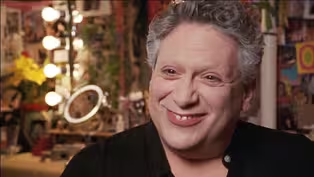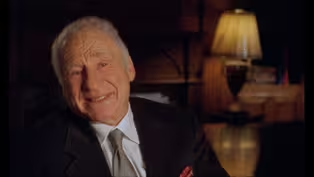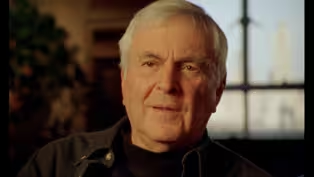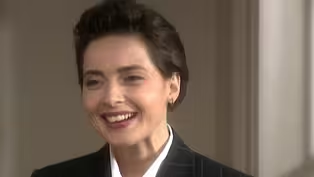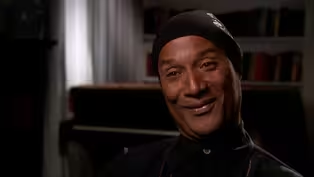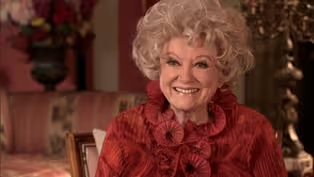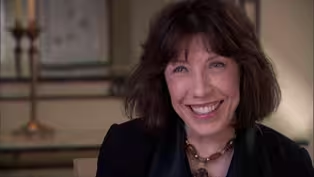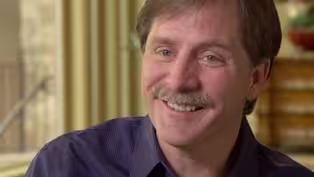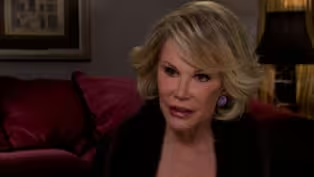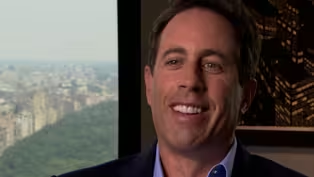
Conan O’Brien gets serious about silliness
Special | 15m 32sVideo has Closed Captions
Conan O’Brien speaks about his style of late night and his reason for doing comedy.
On July 16, 2008, Conan O’Brien spoke about his style of late night and his reason for doing comedy. Interview conducted by director Michael Kantor for the six-hour PBS comedy series, “Make ‘Em Laugh: The Funny Business of America” (2009).
Problems playing video? | Closed Captioning Feedback
Problems playing video? | Closed Captioning Feedback
Support for American Masters is provided by the Corporation for Public Broadcasting, AARP, Rosalind P. Walter Foundation, Judith and Burton Resnick, Blanche and Hayward Cirker Charitable Lead Annuity Trust, Koo...

Conan O’Brien gets serious about silliness
Special | 15m 32sVideo has Closed Captions
On July 16, 2008, Conan O’Brien spoke about his style of late night and his reason for doing comedy. Interview conducted by director Michael Kantor for the six-hour PBS comedy series, “Make ‘Em Laugh: The Funny Business of America” (2009).
Problems playing video? | Closed Captioning Feedback
How to Watch American Masters
American Masters is available to stream on pbs.org and the free PBS App, available on iPhone, Apple TV, Android TV, Android smartphones, Amazon Fire TV, Amazon Fire Tablet, Roku, Samsung Smart TV, and Vizio.
Buy Now
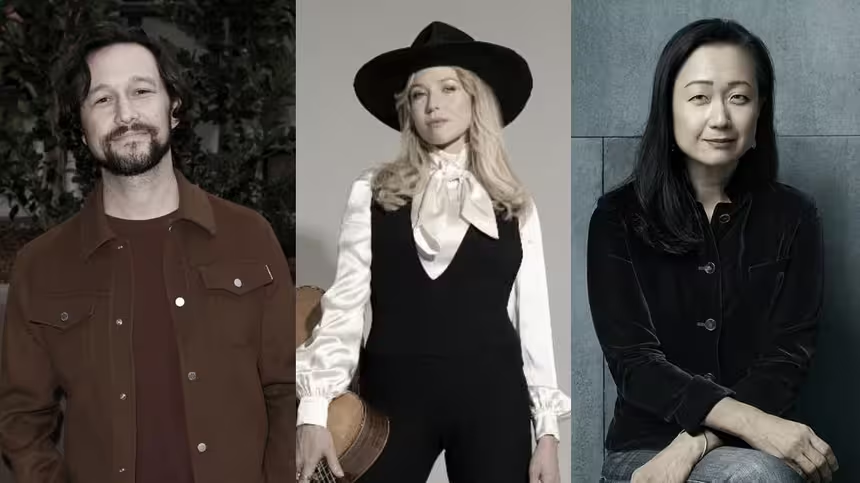
A front row seat to the creative process
How do today’s masters create their art? Each episode an artist reveals how they brought their creative work to life. Hear from artists across disciplines, like actor Joseph Gordon-Levitt, singer-songwriter Jewel, author Min Jin Lee, and more on our podcast "American Masters: Creative Spark."Providing Support for PBS.org
Learn Moreabout PBS online sponsorshipMore from This Collection
Watch curated interviews from The American Masters Digital Archive. The full collection includes over 1,000 hours of never-before-seen, raw interviews: a treasure trove of the movers and shakers of American culture, including Maya Angelou, Patti Smith, Mel Brooks, Carol Burnett, Matthew Broderick, Carl Reiner, Joan Rivers, Dionne Warwick, Lee Grant, Sidney Lumet, Betty White and many others.
Harvey Fierstein on gay representation on Broadway and its deep history
Video has Closed Captions
Harvey Fierstein talks to director Michael Kantor backstage during the production of "Hairspray." (13m 8s)
Video has Closed Captions
Ringo Starr describes his friendship with Mae West. (10m)
Mel Brooks' wild ride to his first Broadway show ever
Video has Closed Captions
Mel Brooks talks about the first Broadway show he ever saw—Cole Porter's "Anything Goes." (5m 44s)
John Kander and Fred Ebb on “Cabaret,” creativity and collaboration
Video has Closed Captions
Composer John Kander and lyricist Fred Ebb talk about how they have worked together. (5m 56s)
Isabella Rossellini compares her acting and modeling
Video has Closed Captions
Isabella Rossellini discusses her acting versus modeling career. (28m 24s)
Quincy Jones explains how he got started in music
Video has Closed Captions
Quincy Jones discusses his early career, friendships and how he defines himself. (15m)
Paul Mooney on his career and relationship with Richard Pryor
Video has Closed Captions
Paul Mooney reflects on the mechanics of stand-up and his role as Richard Pryor's best friend. (10m 39s)
How Phyllis Diller broke down the doors for female comics
Video has Closed Captions
Phyllis Diller reflects on how her comedy was a response to years of “take my wife” jokes. (11m 35s)
How Lily Tomlin found liberation in exploring her Laugh-In characters
Video has Closed Captions
Lily Tomlin speaks about her time on Laugh-In and how she developed her characters. (12m 35s)
Jeff Foxworthy on how every American might be a "redneck"
Video has Closed Captions
Jeff Foxworthy discusses regionalism in comedy and why "redneck" is a state of mind. (15m 41s)
Joan Rivers finds humor in being yourself
Video has Closed Captions
Joan Rivers speaks about her experience as a female comic in the early 60s. (9m 59s)
Jerry Seinfeld on his place in American sitcom history
Video has Closed Captions
Jerry Seinfeld discusses his collaboration with Larry David and the evolution of the sitcom. (16m 1s)
Providing Support for PBS.org
Learn Moreabout PBS online sponsorship- Everybody does a late night show differently.
The late night show is all about who's the host.
It's an extension of their personality, I think, and everybody does it differently.
And so I look at the other late night shows, and on the surface there'll be similarities.
There's the desk, and there's the band, and you tell some jokes.
But after that, I think, the shows are different and should be different because the people hosting them are very different people.
So for me, personally, I don't like pointed comedy.
I'm less interested in making a insightful satirical comment that rattles the White House or unhinges the power elite.
That's not really what got me into comedy.
I like silliness.
I like things that make me laugh.
I like things that make me laugh really hard without thinking about them too much.
And I think that can be the smartest comedy.
I think it's the hardest comedy to come up with sometimes, is just something that's visual, or silly, or fun, and it makes people laugh, and it endures.
And so my favorite monologue jokes, if I told them to you, if I could even remember them, would not be ones where I skewered the president, or skewered in administration's policy.
There would be very silly jokes about a man in Scranton who got his testicle caught in a combine.
And I know the man, he's fine.
But that's the kind of stuff that just always appealed to me.
And so, you know, and all the things I've worked on in my career, like "The Simpsons," I've always been drawn to the silliness, the cartoonish silliness of, you know, physical comedy.
That's the stuff I always loved.
So that's my approach.
That's what I like to infuse my show with.
And I really respect these other shows.
I think they're fantastic.
But I know that, you know, if I had to host someone else's show and do it their way, I'd be miserable, and I'd quit after a day.
I like funny, and that sounds like, on a special that I'm guessing is this sophisticated, that sounds like a stupid thing to say, but I relentlessly, I resist the conscious attempt to be too cerebral.
And one of the reasons I love about the Marx Brothers, I was watching, I think it was two nights ago, I watched "Night at the Opera" again, and there's no reason for it.
It's just funny.
I mean, you know, they're in Italy, and then they're on a ship and they're messing around the ship, and, you know, Harpo's jumping out a porthole.
And then they're in New York, and someone's trying to arrest them, and they're running around room to room, and then suddenly they're in the opera house.
And there's just a frenetic silliness to it that, to me, is life affirming.
And that's the stuff that I love.
And one of my favorite quotes is from Groucho Marx.
Years after he made "Duck Soup," some intellectual writer was interviewing him and said, "Now, Groucho, it's so fascinating.
"Duck Soup" was clearly the Marx Brothers responding to the rise of fascism in Italy and Germany, and this was your comedic attack on that, you know, horrible movement."
And Groucho took the cigar outta his mouth and said, "What are you talking about?
We were four Jews trying to get a laugh."
And it just rang so true to me.
Great.
Did it help people find fascism ridiculous?
Maybe.
Sid it in any way help?
Who can say?
I think, you know, bullets were better than a movie, but it was just funny.
It was just funny.
And they were being silly.
And that's what I liked.
WC Fields, you know, playing ping pong at the society party.
Three Stooges, there's some great stuff that the Three Stooges do.
You know, when snobbery starts to creep into comedy, I get very suspicious.
And, you know, the Marx Brothers, there's the randomness and silliness of it.
Why any of that?
Why a guy with a piece of tape for a mustache bent over and accompanied by a guy with a top hat and a horn at the end of his cane, and an Italian guy who plays the piano?
Like, why any of it?
And that's what's beautiful about it.
You know, what's the beauty of comedy?
It's Darwinian.
The good idea in a good comedy system... And "Saturday Night Live" is clearly, you know, it's a good system.
It's flawed.
My system's flawed now on "Late Night."
They're all flawed in their own way.
Good ideas just present themselves like a peacock.
You can't deny it.
You can't keep a good idea down.
And so when there's a funny idea that's gonna work and make the show a little better, it's gonna get on "Late Night with Conan O'Brien."
It's gonna get on "Saturday Night Live."
Every now and then, you know, there'll be people that bitch about, "Well, my idea really would've been great, but they kept me down."
I think, I doubt it.
Everybody wants, you know...
If an idea is really funny, it's like finding a diamond in the dirt.
You know?
You're not gonna toss it away.
It's gonna get on.
My favorite thing that Andy Kaufman did was his whole scam with wrestling.
I mean, to me, that was the funniest thing that Andy Kaufman did.
And there was, I think a documentary I saw a number of years ago, which might be one of my favorite things ever, which was Andy Kaufman on wrestling.
And it was just a documentary about his whole, you know, journey wrestling women and threatening to wrestle, you know, was it Jerry Lawler?
And what I love so much about it is it's not for anyone.
It's so clearly just for him.
Who's the audience for that?
Do you know what I mean?
Everyone who came to see those wrestling matches just hated him.
Most people who saw his appearances on Letterman thought it was real, and something was wrong with him, you know?
Who was that for?
He just had the strength of his conviction.
He, you know, had an incredible waste of everyone's time.
And that was part of what, I think, made it so funny.
You know, I mean, and all those things that he was doing, he had a religious conviction in it.
And I think that's so much of what makes it powerful and makes it funny.
You don't get the impression he was worried, how's this whole wrestling thing going over?
Well, what are you talking about?
What's the point of it?
What's the point of any of it?
I mean, to me, what's most fantastic about it is that there's a lot of it that just seems pointless.
And, you know, that speaks to me in some way.
Some of my favorite things that we've ever done here.
There's no point to it.
You know, these images come up in my head and I'm like, "Why did we do that?"
I don't know.
It really made me laugh.
It was pointless.
So, yeah, I don't know who he was doing all that for.
You know, primarily himself.
And that's what most of the great artists are doing.
I don't think all comedians are necessarily oddballs.
I mean, because there are clearly people that you like and admire that are comedians.
Johnny Carson comes to mind.
Johnny Carson was not some outside weirdo struggling to get in and comment on what's happening.
He was someone with just a very good sense of humor who is inordinately charming.
You know what I mean?
And so I don't wanna characterize all comedians as being outsiders, or loners, or weirdos.
I'm fun at a party.
But definitely, I think a lot of the root of comedy is maybe coming from a place of being excluded or outside.
I mean, many people have made the point that, you know, who's funny?
Jewish people are funny.
Irish people are funny.
They're groups that were excluded, or left out, or they were sublimated.
They had no power.
This is a way to worm your way back into the system.
Well, comedy's a defense mechanism.
And basically, I remembered saying to my father once, that I'm earning a living exploiting something that should probably be treated.
And I think that's true.
I really do think that you work with what you've got, and people instinctively know what they're not good at and what they're good at, at a very early age.
And I maintain that at the age of four or five, non-athletes know they're not athletes.
And they know, "Okay, that's not gonna work.
And I'm not the best looking guy in the world.
And I don't have this, I don't have that."
But if you have an ability to make people laugh, you find out early.
And probably everyone you're talking to has said, yeah, I started making people laugh at the family dinner table, you know, in the playground at school.
You figure that out, you start using that to get by, and then you hyper develop it, and then you overdevelop it, and then you're not fit for anything else.
And then you're a comedian who's miserable on the weekends.
And I really believe that that's how it works.
It sounds crazy, and I'll say this.
I'll tell you guys this.
I actually hate jokes.
I tell jokes at the top of my show, but only so that I can then play with the audience's reaction to them.
I can never remember jokes, and jokes to me are too obvious.
Like, they're too, I'm going to tell you something, and then you're going to laugh.
Well, that's completely contrary to my nature.
My nature is I wanna make you laugh, but I don't wanna tell you, I'm gonna make you laugh.
Do you know what I mean?
It's too...
So as a consequence, I've had people come up to me and they say, "Oh, tell us a joke."
I don't know any jokes.
But if you put me in a situation where for an hour I have to entertain you, I'll make you laugh.
I don't know what's gonna happen.
And it might get pretty ugly, but I certainly don't have a joke memorized.
I admire, you know, I saw, when I first got out to Los Angeles, I went to an event and Milton Burl was the MC, and this is probably when he was probably 78 at the time.
Hilarious.
Jokes, fantastic jokes, rattling 'em off, one after the other.
They were all in his head.
You know, he had hundreds of thousands of jokes, and they were great.
And he was fantastic.
And I looked at him and I remember thinking, "I'm not one of those guys."
You know, I think, I can make people laugh out of a nervous desperation bred from self-hate, which is the parental fault, but just had to sneak that in.
They won't watch.
But those guys that know all those jokes, I admire it.
I don't have that kind of brain.
Can't remember 'em.
They're like math tables to me.
I still don't know what eight times eight is.
One of the things that's great about Buster Keaton is that he was relentlessly sad.
And I've noticed that that really works well for me if you have a certain kind of face.
I think some of the biggest laughs I've had on this show are, I'm not saying a word, I'm just looking sad.
So, do you know what I mean?
We'll have a beautiful actress on the show.
And you know, she'll say, "If I had known you a few years before you got married, Conan, you know, I'd have taken you to bed."
And then just the director cuts to me, and there's a deep sadness.
I don't say a word.
And the crowd really likes it.
They like when I'm defeated.
I don't know why, but I know that at an early age that when I look sad in a certain kind of situation, people really enjoy it.
It's also Jack Benny that wistful sadness.
And Buster Keaton had that, which is, you know, most miserable looking person you've ever seen in comedy.
And it's sort of relentlessly funny.
Yeah, we've done 2,624 hours of "Late Night" here at the Conan O'Brien fiasco.
And so it's impossible for me to isolate, you know, any one thing we did.
I mean, one of my favorite things is when I somehow got involved in the presidential elections in Finland, and it just kept escalating and escalating and escalating.
And we kept doing more and more things on our show that were then shown in Finland.
And then the New York Times picked up on it.
It all culminated with me announcing that I was going to Finland.
And I went to Finland and thousands of people at the airport.
Screaming mobs pursued by the media in Finland, all over the place.
And then finally it culminated in meeting the president of Finland at the palace.
People lined up around the gates, you know, chanting my name.
I met with her, and then I walked out, and these guards opened a door, and I walked out on the steps, and the crowds were cheering.
And I remember standing there and thinking, "I did it."
You know, like it was a real, we've done it moment.
I've met with the president.
It's all culminated.
I've walked out.
The crowds are cheering.
And it was, again, that did what?
Was the point of all this?
It was a completely silly...
It was harmless.
But it was everything that I love about comedy.
It was an idiot in over his head, fish outta water.
I had no business being there, famous in that country for no reason.
And meeting with a head of state, and being presented with a plaque, and then walking out onto a balcony, and being cheered by a mob for no reason.
It was every, you know, classic comedy I've ever loved.
It was just the randomness of it and the absurdity of it all.
And it was just, you know, to me that warms my heart that in a world, you know, the world that we have today that can seem so serious, something so pointless and silly, and, I think, good natured could just happen for no reason.
And, you know, so those are the moments on my show that I always love, that just, you know, and that I remember.
Do you know what I mean?
Those are the moments that resonate with me.
And those are the moments that I think, when I'm 90, if I'm still alive, I'll be sitting on a porch somewhere in Maine, no one will know who I am, and I'll be wearing a wifebeater T-shirt and drinking whatever juice keeps me alive till 90, And I'll be thinking, "That'll be the stuff I'll be reflecting on."
Support for PBS provided by:
Support for American Masters is provided by the Corporation for Public Broadcasting, AARP, Rosalind P. Walter Foundation, Judith and Burton Resnick, Blanche and Hayward Cirker Charitable Lead Annuity Trust, Koo...

